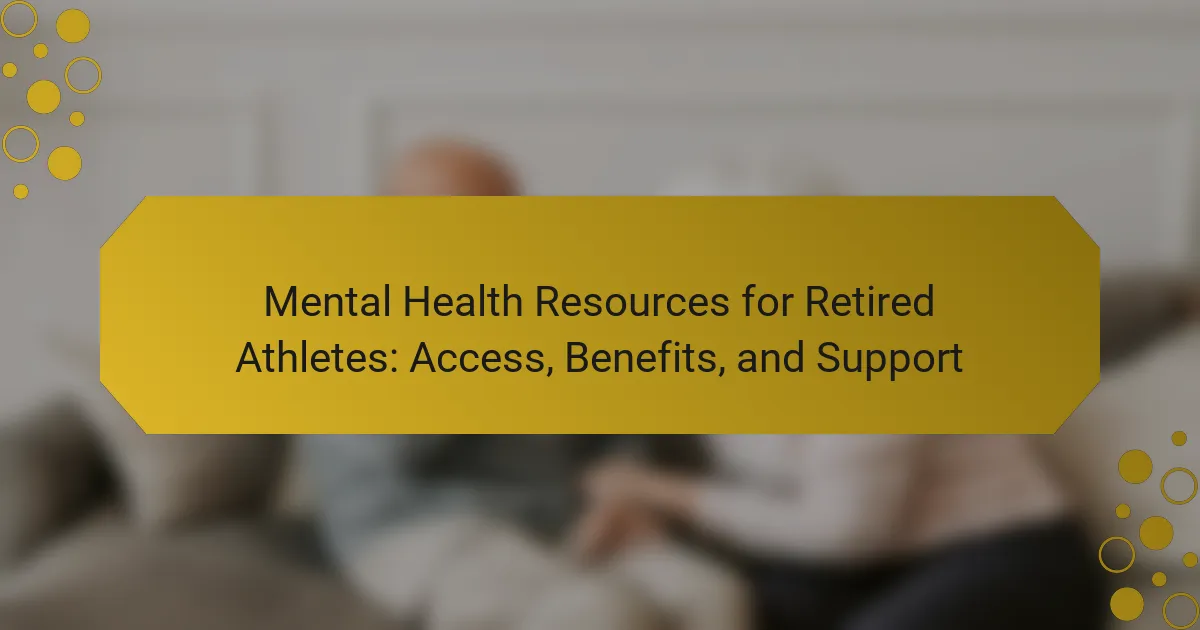Retired athletes often face mental health challenges such as anxiety and identity crises after leaving competitive sports. Access to tailored resources like counselling services, peer support groups, and mental health hotlines is vital for their emotional well-being. Specialized programmes from organizations like the Professional Athletes Foundation and the NFL Player Assistance Program address these unique struggles. Engaging in community activities and workshops further promotes resilience and personal growth.
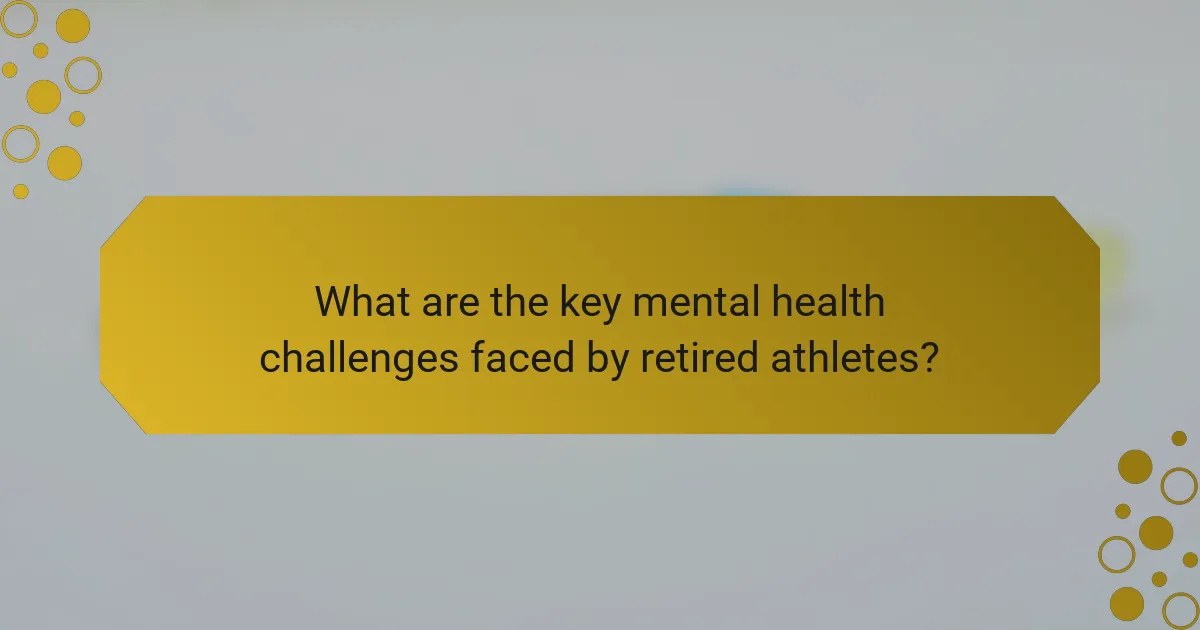
What are the key mental health challenges faced by retired athletes?
Retired athletes face significant mental health challenges, including anxiety, depression, and identity crises. These issues often stem from the abrupt transition from competitive sports to everyday life. Resources such as counselling, peer support groups, and mental health hotlines can provide vital assistance. Access to these resources is essential for promoting emotional well-being and addressing the unique struggles retired athletes encounter.
How does the transition from active sports impact mental well-being?
The transition from active sports can significantly affect mental well-being, often leading to challenges such as identity loss and depression. Retired athletes may struggle with the absence of structured routines and social connections previously found in sports. Mental health resources specifically designed for retired athletes offer access to counselling, peer support, and coping strategies. These resources can enhance emotional resilience and provide a sense of community, which is crucial for maintaining mental health post-retirement. Engaging in new activities or sports can also mitigate negative impacts and improve overall well-being.
What role does identity play in the mental health of retired athletes?
Identity significantly impacts the mental health of retired athletes by influencing their self-esteem and sense of purpose. Transitioning from a competitive environment can lead to identity loss, resulting in anxiety and depression. Mental health resources tailored for retired athletes can help address these issues by providing support and fostering a new sense of identity. Engaging in community programmes and therapy can facilitate a smoother transition and enhance overall well-being.
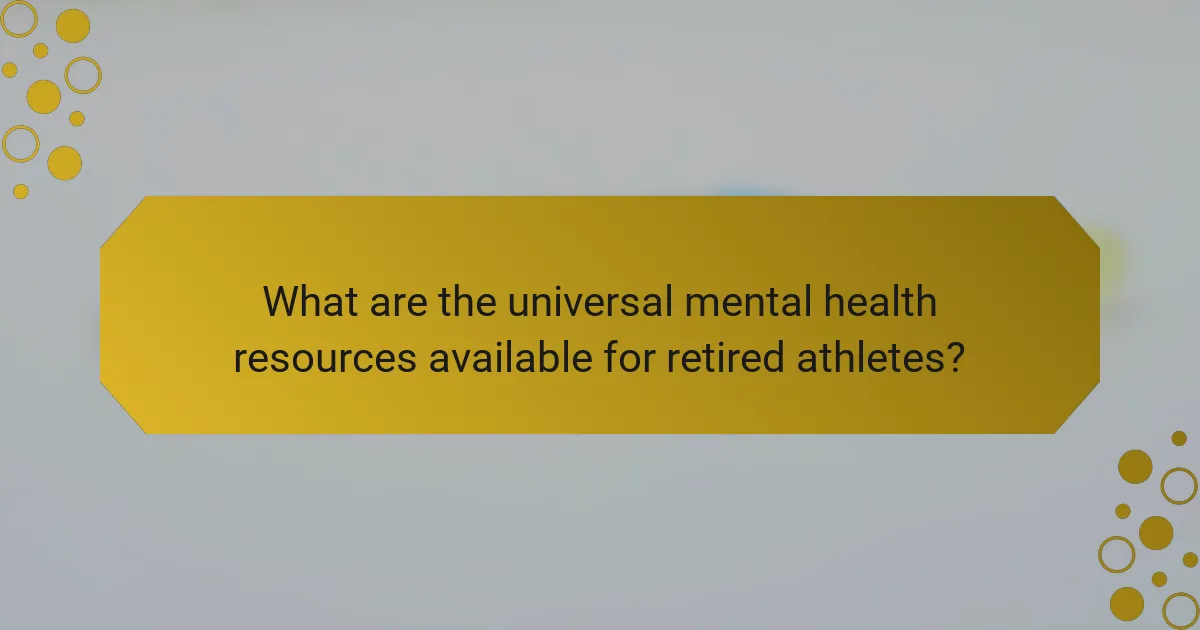
What are the universal mental health resources available for retired athletes?
Retired athletes have access to various universal mental health resources that provide essential support. Key resources include counselling services, peer support groups, and mental health hotlines specifically designed for athletes.
Counselling services offer professional guidance tailored to the unique challenges faced by retired athletes, such as identity loss and transition difficulties. Peer support groups foster community and shared experiences, helping retirees connect with others who understand their journey. Mental health hotlines provide immediate assistance and resources for those in crisis, ensuring help is available 24/7.
Additionally, organizations like the Professional Athletes Foundation and the NFL Player Assistance Program offer specialized programmes focusing on mental health awareness and support. These resources aim to address the root causes of mental health issues while promoting overall well-being among retired athletes.
What types of counselling services are commonly accessible?
Commonly accessible counselling services for retired athletes include individual therapy, group therapy, family counselling, crisis intervention, and telehealth services. These options provide mental health support tailored to the unique challenges faced by retired athletes, such as identity loss and adjustment issues. Individual therapy focuses on personal experiences, while group therapy fosters community and shared understanding. Family counselling addresses relational dynamics, and crisis intervention offers immediate support. Telehealth services enhance accessibility, allowing athletes to connect with professionals remotely.
How can support groups benefit retired athletes?
Support groups can significantly benefit retired athletes by providing emotional support, reducing feelings of isolation, and facilitating a smoother transition to post-athletic life. These groups foster connections with peers who understand the unique challenges faced after retirement, enhancing mental well-being. Participation can lead to improved coping strategies, shared experiences, and access to valuable resources. As a result, retired athletes often report increased life satisfaction and reduced anxiety levels.
What online platforms offer mental health resources?
Numerous online platforms offer mental health resources specifically for retired athletes. These include specialized organizations, support groups, and mental health apps that cater to their unique experiences and challenges.
1. Athlete Assistance Program – Provides counselling and resources tailored for former athletes.
2. The Trust – Offers mental health support and wellness programmes for retired athletes.
3. Mindfulness Apps – Applications like Headspace and Calm promote mental well-being through guided practices.
4. Online Support Groups – Platforms like Facebook and Reddit host communities for shared experiences and peer support.
5. Telehealth Services – Services such as BetterHelp and Talkspace offer virtual therapy tailored to athletes’ needs.
6. National Alliance on Mental Illness (NAMI) – Provides educational resources and support for mental health issues.
These platforms can significantly enhance retired athletes’ mental health by providing access to tailored support and community resources.

What unique mental health initiatives cater specifically to retired athletes?
Unique mental health initiatives for retired athletes include specialized counselling programmes, peer support networks, and workshops focused on transition challenges. These initiatives address the unique psychological needs of retired athletes, providing tailored resources that enhance mental well-being and community connection. Programs like the NFL Player Care Foundation and similar organizations offer access to mental health professionals experienced in sports-related issues. As a result, retired athletes can find effective support systems that promote emotional resilience and personal growth.
How do organizations like the Professional Athletes Foundation provide support?
Organizations like the Professional Athletes Foundation provide essential support through mental health resources tailored for retired athletes. They offer access to therapy, counselling, and peer support networks, helping athletes navigate the challenges of retirement. Additionally, they promote awareness of mental health issues and advocate for the importance of emotional well-being. Programs often include workshops and seminars that focus on coping strategies, enhancing resilience, and fostering a sense of community among former athletes. These resources significantly contribute to improving mental health outcomes and quality of life for retired athletes.
What tailored programmes exist for specific sports?
Tailored programmes for specific sports focus on mental health support for retired athletes. These programmes often include counselling, workshops, and peer support groups. For example, the NFL offers mental health resources specifically designed for former players, addressing unique challenges they face. Additionally, sports organizations like the NBA and Olympic committees provide tailored workshops that emphasize coping strategies and community building. Access to these resources can significantly improve mental well-being, fostering a supportive environment for athletes transitioning to retirement.
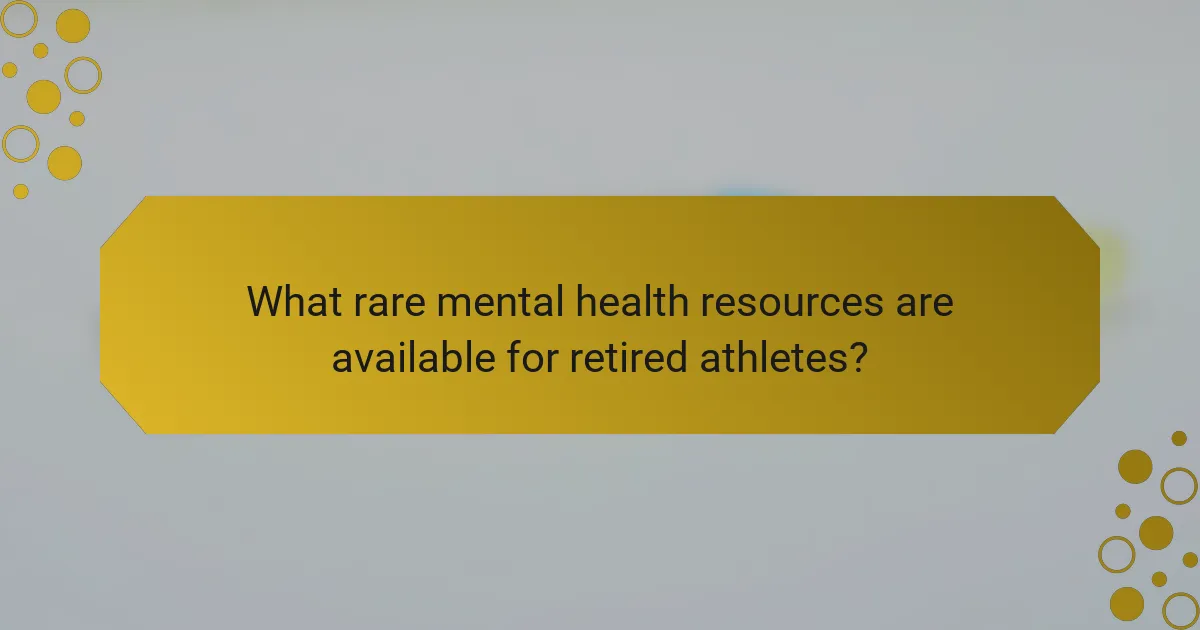
What rare mental health resources are available for retired athletes?
Retired athletes have access to unique mental health resources tailored to their specific experiences. Programs like the “Athlete Assistance Program” offer counselling and support, while organizations such as “The Professional Athletes Foundation” provide mental health education and workshops. Additionally, rare resources include peer mentorship programs connecting retired athletes with mental health professionals who understand their unique challenges. These initiatives focus on promoting well-being and resilience among former athletes.
Are there specialized retreats for mental health recovery?
Yes, there are specialized retreats for mental health recovery tailored for retired athletes. These retreats focus on addressing unique challenges faced by former athletes, such as identity loss and mental health issues. Programs often include therapy, physical activity, and peer support, fostering an environment of healing and understanding. Access to these retreats can significantly enhance recovery, providing a safe space for emotional expression and personal growth.
What innovative therapies are being introduced for retired athletes?
Innovative therapies for retired athletes include mental health support systems, mindfulness training, and virtual reality therapy. These approaches aim to enhance emotional well-being and provide coping strategies. Access to these resources can significantly improve retired athletes’ mental health outcomes, fostering a supportive community. For instance, mindfulness training has shown a 30% reduction in anxiety levels among participants.
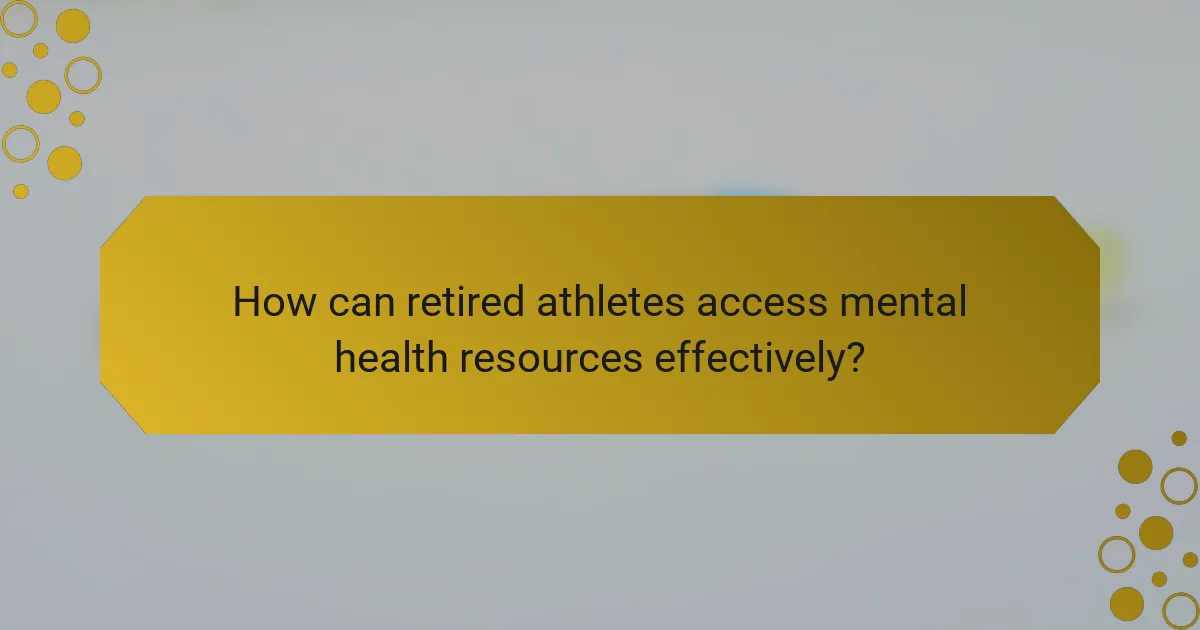
How can retired athletes access mental health resources effectively?
Retired athletes can effectively access mental health resources through specialized programmes, support groups, and online platforms. These resources often provide tailored support that addresses the unique challenges faced after retirement.
Programs like the NFL’s Player Care Foundation and the NBA’s Mental Health Initiative offer confidential counselling and workshops. Additionally, online platforms such as Talkspace and BetterHelp provide accessible therapy options.
Support groups foster community and shared experiences, allowing retired athletes to connect with others facing similar issues. These resources enhance mental health, promoting well-being during the transition from sports to everyday life.
What steps should they take to seek help?
Retired athletes seeking help should take specific steps to access mental health resources. First, they should identify their needs and concerns. Next, they can reach out to support networks, such as fellow athletes or organizations dedicated to mental health. It is crucial to research available resources, including counselling services, support groups, and hotlines. Finally, scheduling an appointment with a mental health professional can provide tailored support and strategies for coping.
How can athletes navigate insurance for mental health services?
Athletes can navigate insurance for mental health services by understanding their policy details and available resources. They should consult with their insurance provider to clarify coverage specifics, including therapy sessions and mental health programmes. Utilizing networks of retired athletes can provide insights into effective strategies for accessing these services. Additionally, many organizations offer support and advocacy for mental health, helping athletes maximize their benefits.
What are the best practices for utilizing online resources?
Utilizing online resources effectively involves a structured approach. First, identify reputable mental health platforms specifically designed for retired athletes. Next, engage with community forums to share experiences and gain insights. Utilize teletherapy services for convenient access to professional support. Explore educational materials to enhance understanding of mental health challenges. Lastly, regularly assess the effectiveness of these resources to ensure they meet personal needs.
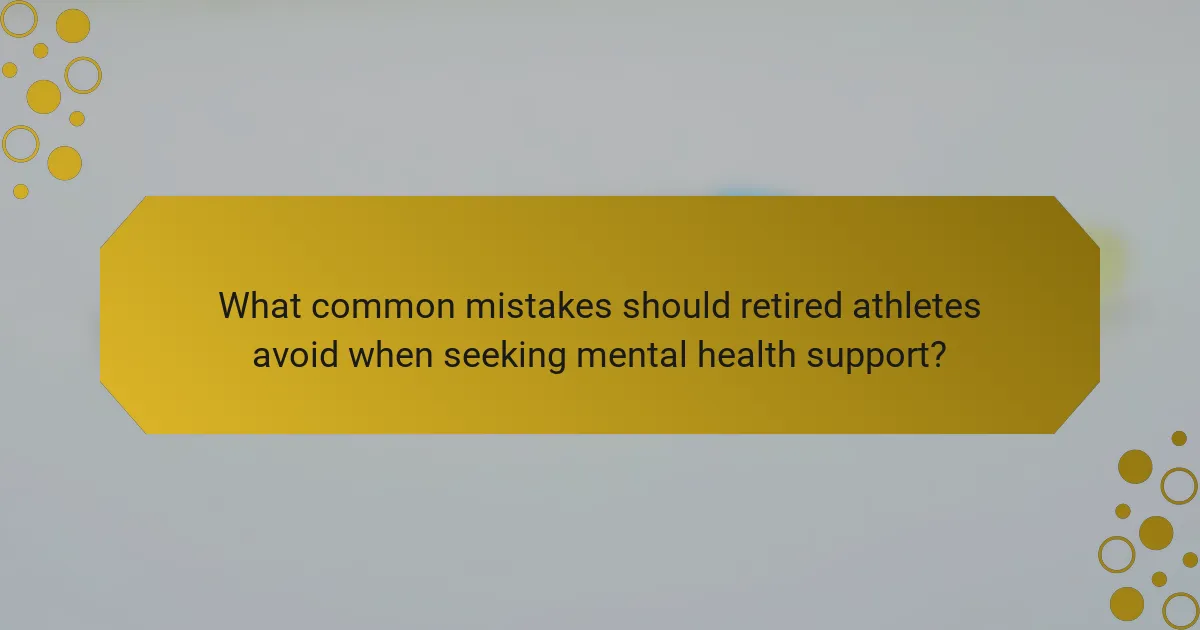
What common mistakes should retired athletes avoid when seeking mental health support?
Retired athletes should avoid common mistakes such as neglecting emotional health, underestimating the importance of professional support, and failing to communicate their needs. Seeking help early can prevent deeper issues. Building a support network is crucial for effective mental health management.
How can they ensure they find the right type of support?
To find the right type of support, retired athletes should assess their specific mental health needs and explore available resources. They can start by consulting with a mental health professional experienced in sports psychology. Joining support groups tailored for retired athletes can provide shared experiences and understanding. Additionally, researching organizations that focus on mental health in sports can offer valuable programmes and resources. Engaging with online platforms that provide mental health information can also be beneficial. Prioritizing personalized care ensures they receive the most effective support.
What signs indicate that professional help is needed?
Signs that indicate professional help is needed include persistent feelings of sadness, anxiety, or hopelessness. Other indicators are withdrawal from social activities, drastic changes in mood, and difficulty concentrating. Retired athletes may experience unique challenges, such as identity loss and adjustment issues, which can exacerbate these symptoms. Seeking support early can prevent further complications and improve overall mental well-being.

What expert insights can enhance mental health strategies for retired athletes?
Expert insights can significantly enhance mental health strategies for retired athletes by focusing on tailored support systems. Access to mental health resources, such as counselling and peer support groups, can foster emotional well-being. Benefits include improved coping mechanisms and reduced feelings of isolation. Unique attributes, like specialized programmes for athletes, address their specific challenges, ensuring a more effective approach to mental health. Engaging in community activities and workshops can also provide social integration, which is crucial for maintaining mental health post-retirement.
What are the recommendations from mental health professionals?
Mental health professionals recommend a variety of resources for retired athletes to support their mental well-being. These include counselling services, peer support groups, and wellness programmes specifically tailored to address the unique challenges faced by former athletes. Access to mental health resources can significantly enhance emotional resilience and overall quality of life. Regular engagement in physical activity and mindfulness practices is also encouraged to promote mental health stability.
How can retired athletes maintain their mental health long-term?
Retired athletes can maintain their mental health long-term by accessing specialized resources and support systems. Engaging in therapy, participating in peer support groups, and utilizing online mental health platforms can provide significant benefits. These resources help in coping with identity shifts and emotional challenges post-retirement. Regular physical activity and mindfulness practices also contribute to improved mental well-being.
